As students flooded into the Student Union on Tuesday for their lunch breaks, the usual sounds of crinkling food wrappers, fizzing soda machines and chatter about end of the semester exams were quieted by nearly a dozen students lying on the ground, chanting “trans lives matter” and “transphobia has got to go” while naming transgender people who have been killed.
“Today, we are here to serve notice that trans lives matter,” Malik Pridgeon, Queer People of Color executive director and an organizer for the protest, said during the demonstration.
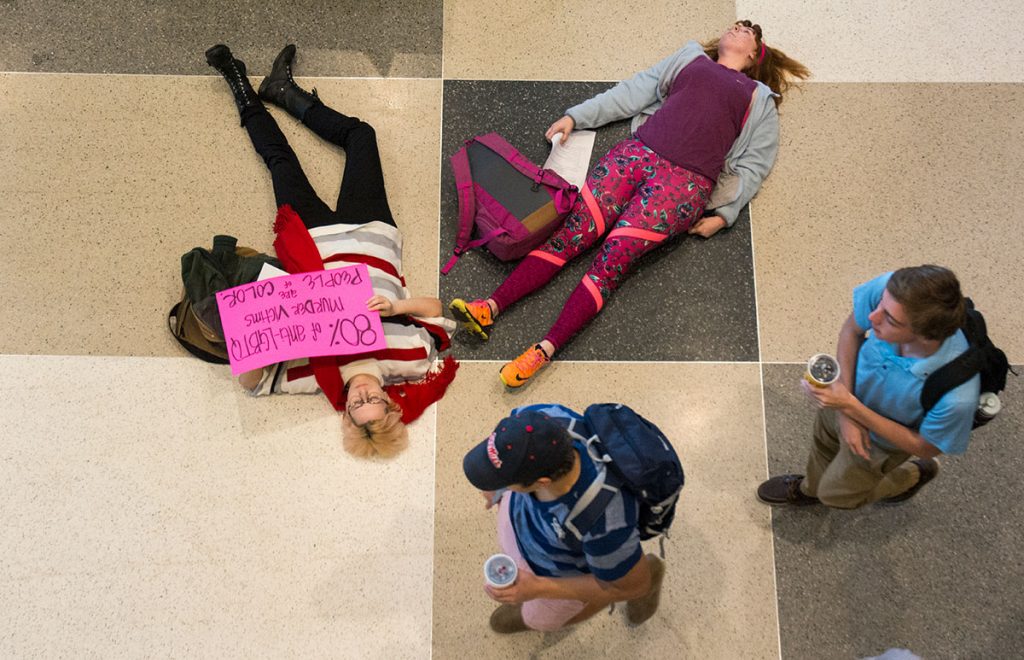
Em Gill, who is transgender, and UM Pride Vice President Brenna Paola lie down in the Union on Tuesday to protest murders of members of the transgender community. Photo by Marlee Crawford
The Transgender Awareness “die-in,” a protest in which participants lie on the ground to represent people who have died, hosted by Queer People of Color and UM Pride Network, was cut short Tuesday afternoon when participants dispersed after three University Police Department officers asked students to not block student traffic through certain areas of the Student Union.
“It was only scheduled to go to 12:45, and the police showed up at 12:42, so we were only cut off by three minutes,” Pridgeon said. “At the end of the day, we did what we wanted to do, which was to bring awareness and honor the lives of those who had been murdered due to their gender expression.”
Senior public policy leadership major Allen Coon, who participated in the protest, said he was disappointed the demonstration had to end early.
“I think that it’s frustrating that students who are just exercising their free speech in a public space is frowned upon,” Coon said. “The reality is that we weren’t infringing on anybody’s freedom in the space.”
Coon said he was troubled with how UPD responded, because people were still able to walk around and move freely throughout the Union.
“Nonetheless, it’s important that students get this message out here,” Coon said.
In an email to The Daily Mississippian after the protest, UPD Chief Tim Potts said he was not there and the event was not shut down.
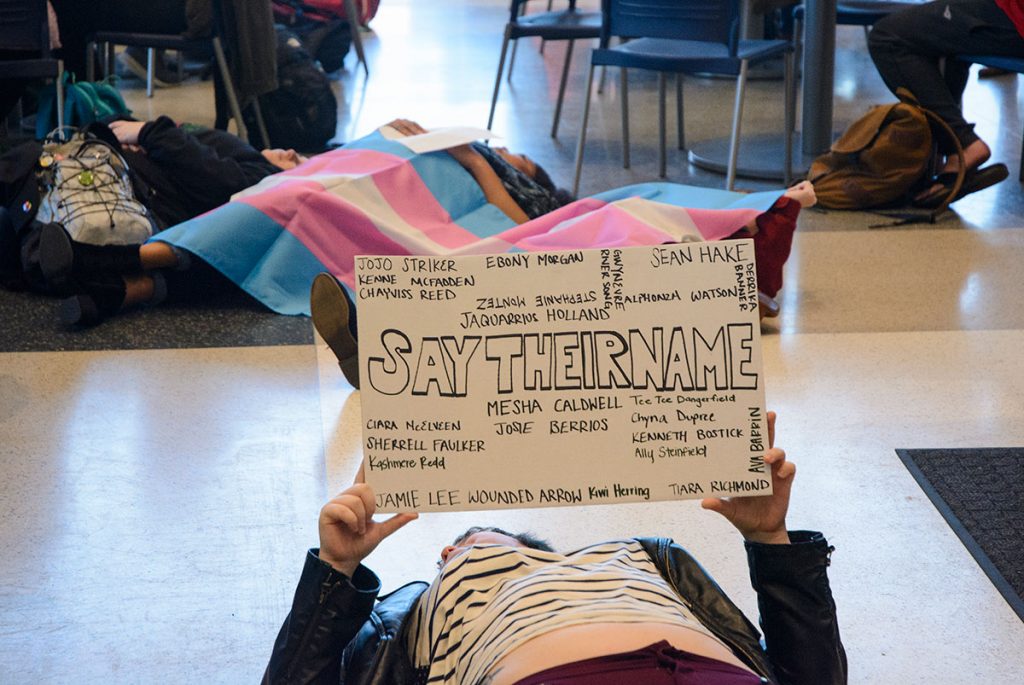
Students demonstrate a die-in in the Union on Tuesday, lying down to represent people within the transgender community that have been killed. Photo by Marlee Crawford
“I think people were asked to move from blocking access to the stairs,” Potts said.
Queer People of Color and UM Pride Network hosted the transgender awareness die-in to acknowledge violence against the transgender community, especially in comparison with that shown toward other minority groups.
“The transgender community is a part of the lesbian and gay community — LGBTQIA,” Pridgeon said. “We all share similar struggles; however, I would have to say our trans brothers and sisters are typically even more unaccepted in comparison to individuals who identify as gay or lesbian.”
The event was held this week as a way to acknowledge that the third week of November is Transgender Awareness Week (TAW).
Pridgeon said celebrating a week dedicated to a community that oftentimes has little to no voice is extremely important, especially in a place like Mississippi.
Pridgeon said it’s important to celebrate Transgender Awareness Week because members of the transgender community need to know they are valued.
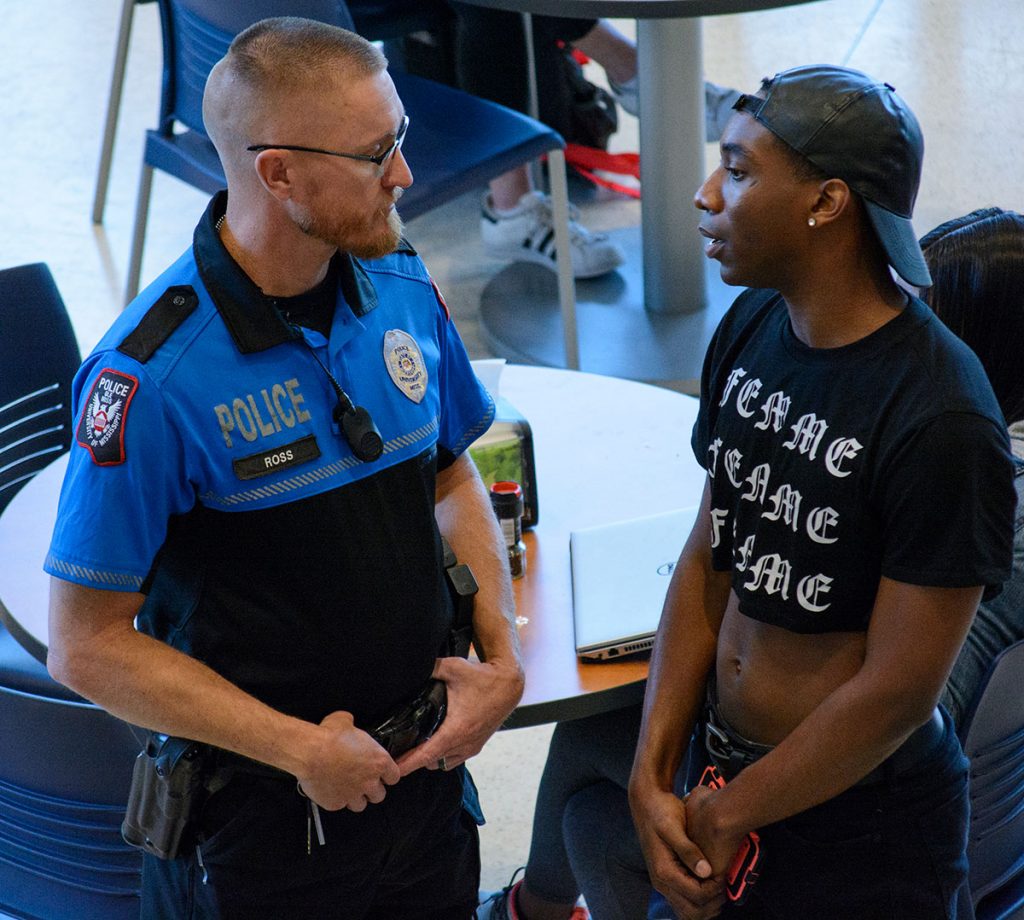
University police officer Daniel Ross speaks with the executive president of Queer People of Color, Malik Pridgeon, to break up the die-in at the Union held on Tuesday. Photo by Marlee Crawford
“TAW is even more important in Mississippi because at the beginning of this year, Mesha Caldwell, a black transgender woman, was murdered in Canton, Mississippi,” Pridgeon said.
Caldwell was found shot to death Jan. 4 and was the first reported transgender person to be killed this year. The Human Rights Campaign reports there have been at least 25 transgender people killed in 2017.
“Silence is consent,” Pridgeon said. “Celebrating TAW is an overt declaration that we will not tolerate discrimination and violence against transgender individuals.”
Danica McOmber, a member of the transgender community in Oxford, said she came to watch the die-in to show her support and act as a voice for the trans community.
“I came here to observe and answer questions if people had them,” McOmber said. “I like to answer questions, and I like to talk to people about what it means to be transgender, without having them feel that they can’t ask me a question because they might offend me.”
She said that although many trans people face violence and persecution after coming out as transgender, she feels she has been accepted both on and off the Ole Miss campus since coming out.
“Attitudes are very accepting towards transgender folks in the community and on campus,” McOmber said. “I have felt very little negative impacts from my transition, which I thought would occur, based on what I had been told.”
McOmber said that though her transition has been relatively peaceful, she believes there is still work to do when it comes to people’s views of the transgender community.
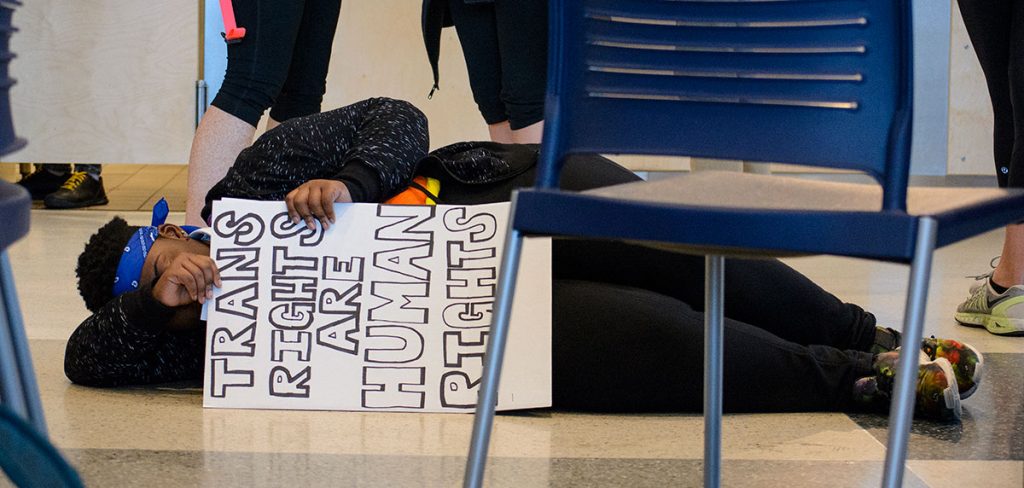
Tykerria Hamlin lies down in the Union during the die-in on Tuesday to protest transgender community murders. Photo by Marlee Crawford
“I do believe that the transgender community has a little more stigma against them than the gay and lesbian community due to transgender folks being seen as mentally ill and self-destructive because we want to change our bodies to match our identity,” McOmber said.
Part of the reason the event ended early was that the papers required to hold a demonstration were not submitted to the Office of the Dean of Students by the organizations’ leaders.
“The point of this is civil disobedience, and so the thing about civil disobedience is that you do not comply with laws,” Pridgeon said. “We want to, in a sense, catch people off guard because we do feel like there could be, perhaps, some kind of infringement or impediment of our protest, had we gone through and gotten the proper authorization.”
Pridgeon said that if the group had submitted the required papers, the office could have told them “no,” and police could have been required to attend, which could have made the protesters and demonstrators uncomfortable.
UM Pride Vice President Brenna Paola said the Student Union was the best place to reach the largest number of people and to spread the word about violence in the LGBTQ community.
“Recognizing the lives of trans people opens up a platform for awareness,” Paola said. “Without an awareness week, it’s easy to be clueless about the prevalence of trans people currently and historically, the terminology acceptably used and the ongoing social activism combatting issues within the community.”
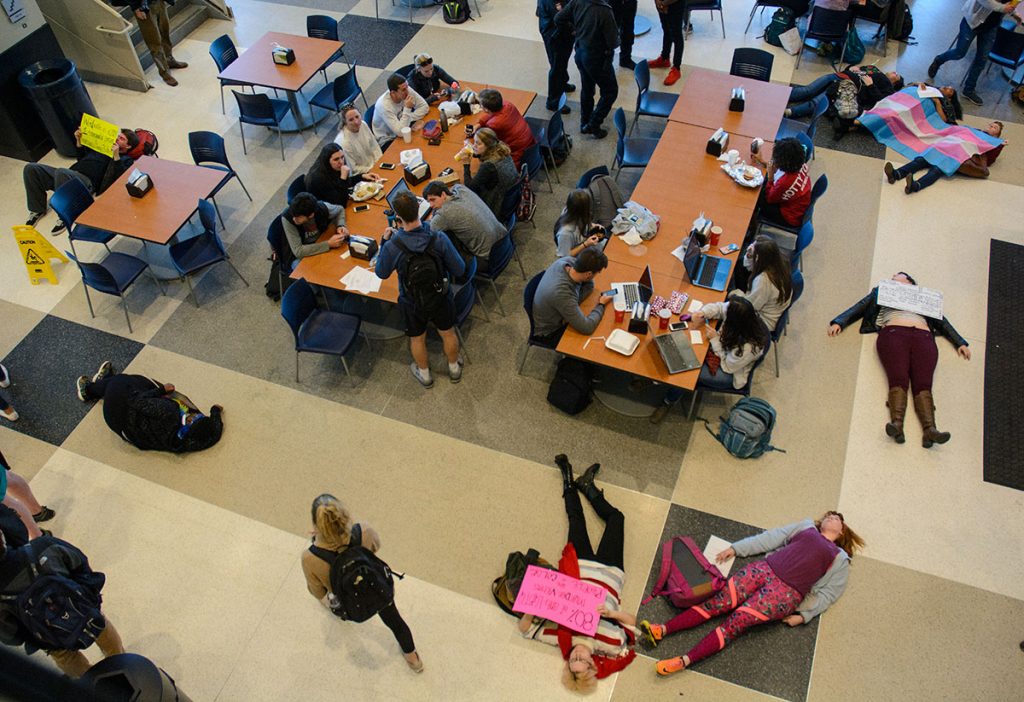
Students lie down in the Union, protesting transgender community suicides on Tuesday. Photo by Marlee Crawford
She said anything short of full support, however, isn’t enough support.
“But I’d be ignorant not to admit that’s an optimistic future,” Paola said. “To have a voice, this community needed enough support to feel safe from harm. It’s a process that involves trans activists as well as ally activists.”
Kristen Walker, vice director of Queer People of Color, said she thought the die-in went well.
“We did what we aimed to do, spread some awareness and shed some light,” Walker said. “We came in here to do the die-in, and we successfully orchestrated it.”






